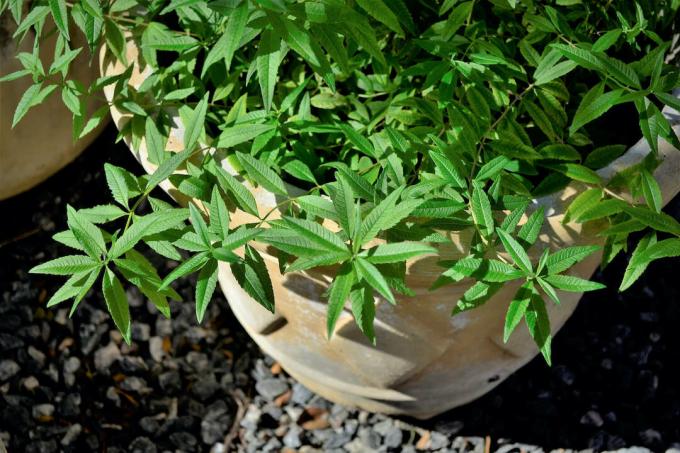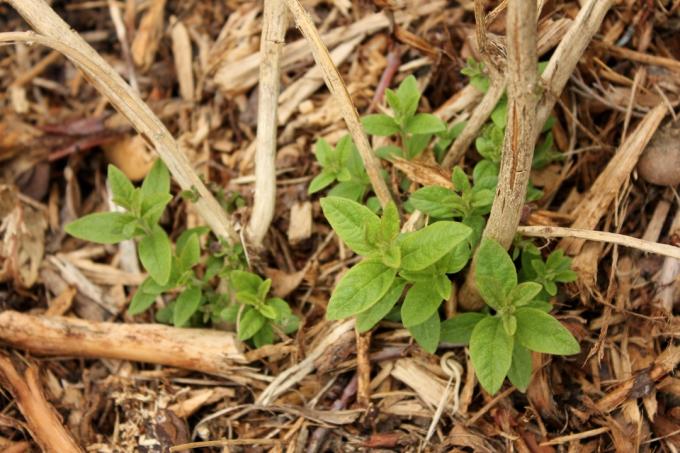Caring for and overwintering lemon verbena requires little effort. However, you will be rewarded with a bountiful harvest and many years of enjoyment from your plant.

Since the lemon verbena (Aloysia citrodora) in the 18th It came to Europe from South America in the 19th century and is considered a popular medicinal and aromatic herb. Lemon verbena is mainly cultivated in France and other southern countries, as it usually does not survive the winter outdoors in our country. But with the right care, cultivation can also be successful here. In this article you will find helpful tips so that you can enjoy your plant for a long time - from pruning the lemon verbena to fertilizing and watering to assessing its winter hardiness.
contents
-
Cultivate lemon verbena
- Cut lemon verbena
- Water the lemon bush, fertilize and Co.
- Hibernate lemon verbena
Cultivate lemon verbena
Although it is generally considered undemanding, you should pay attention to a few aspects when caring for the lemon bush in order to enjoy it for as long as possible.
Cut lemon verbena
In autumn, before the first frost is announced, you should cut back the lemon verbena. Leave two eyes on each shoot. New growth usually occurs at the tips of the shoots. If the branches were left long, they would remain bare below and new shoots would only grow at the top two eyes.
Even during the season, if necessary, the lemon bush can be pruned harder for the harvest.
Important: If your lemon verbena has to survive light frosts in the winter quarters, it is better to wait until spring to prune it. The cut in autumn could reduce the frost hardiness.

Water the lemon bush, fertilize and Co.
The soil should always be kept slightly to moderately moist. However, excessive watering of lemon verbena is not recommended, as the plant becomes more susceptible to disease if the root ball is permanently saturated with water. Occasionally dry soil does not bother her, but a complete drying out of the substrate should be avoided.
Regular fertilizing of lemon verbena between April and August promotes lush, bushy growth. Ours, for example, is particularly suitable Plantura organic flower and balcony fertilizer, which is added to the irrigation water about every two weeks. It contains a lot of nitrogen, which meets the high requirements of lemon verbena. It's also 100% organic and completely animal-free. This means that neither blood nor bone meal nor other animal components are found in it.
In the right substrate and with enough space, lemon verbena can grow very luxuriantly. Therefore, repotting the lemon verbena into a new pot with fresh soil should be done about every two years. It is time for this at the latest when the entire substrate is rooted and roots are already lifting out of the substrate or growing out of the drainage hole at the bottom. Ideally, lemon verbena should be repotted in spring, before the start of the growth phase. Then the plant has enough nutrients and can start the new season stronger.
Tip: When repotting, the universal soil can be supplemented with a granular fertilizer with a long-term effect, such as ours Plantura organic universal fertilizer, to be mixed up. In this way you can manage the entire following year without additional fertilization. In addition, expanded clay can be added to older plants for more structural stability. It means that the verbena has to be repotted less often. For this, however, the plant should be watered a little more frequently.
Hibernate lemon verbena
The lemon verbena is considered conditionally hardy, as it only survives temperatures of around -5 to -8 °C. So if you want to be on the safe side, bring the tub or potted plant inside before the first frost. Hibernation can be done in two ways.
The easiest way is to prune lemon verbena before wintering, as detailed above. It can then be overwintered in a dark and cool place at around 5 °C, for example in a garage or shed. If necessary, the pot can also be wrapped in a jute sack to protect the rootstock of the lemon verbena from colder temperatures. Pruning rids the plant of its leaves, which it would most likely lose anyway, and reduces the risk of rot. In addition, you don't have to water them as often and you can put them in a dark place without hesitation. So she doesn't need a bright window seat, which can be hard to find in winter. Nevertheless, you should occasionally check on your "verveine odorante" - that's what lemon verbena is called in French - because the soil must not dry out completely.

Alternatively, lemon verbena can also be overwintered warm in the house. It is extremely important to place the lemon bush in a bright place, for example on a south-facing window or in a conservatory. In addition, it should not be too cold with temperatures between 10 and 16°C. In this way, the plant keeps its leaves, so that you can always have fresh leaves even in winter Harvesting and using lemon verbena can.
Can you overwinter lemon verbena outside? In mild winters and in particularly sheltered locations, lemon verbena can survive the cold season outdoors. Overwintering at slightly below zero, for example in a garage or in an unheated, closed greenhouse, is possible. You can additionally protect the plant from the cold by covering it with leaves, a thick layer of straw, brushwood or garden fleece. In this case, do not cut the verbena in the fall, but only in the spring.

The lemon verbena sprout again at constant temperatures of around 15 °C. From March onwards, the plant can therefore be left to grow in a moderately heated room. After about ten days, the first tender leaves and shoots should appear. If no more frost is expected, the lemon verbena can go outside again from mid-May. Intensive watering and fertilizing give the plant new vitality and strengthen it for the coming year.
When winter approaches, not only lemon verbena should be protected from frost and brought indoors. We therefore give further tips on the right one in a separate article Overwintering of potted plants.

